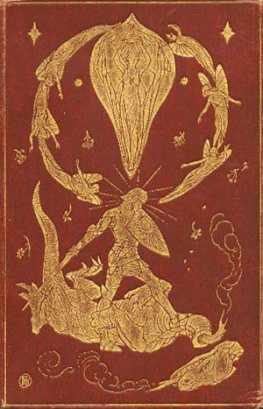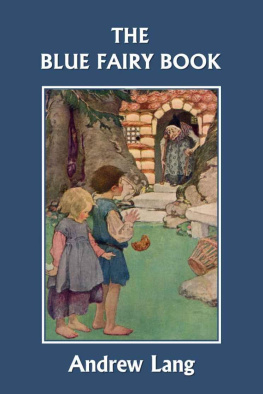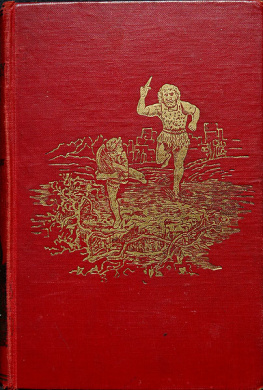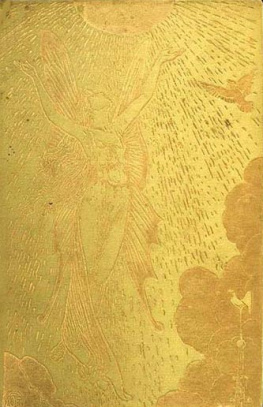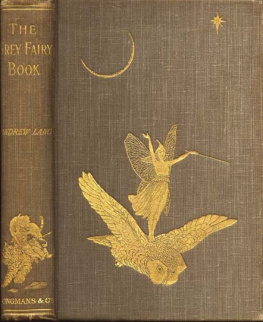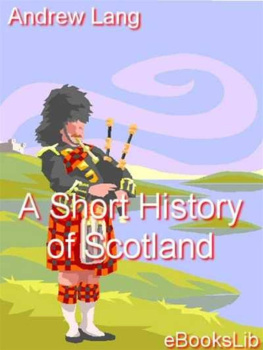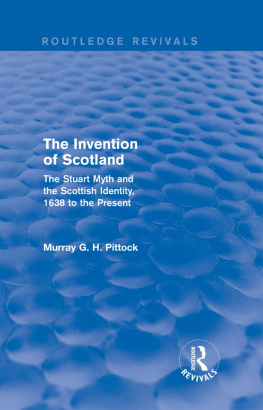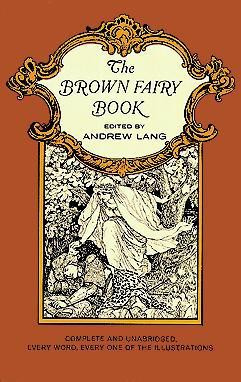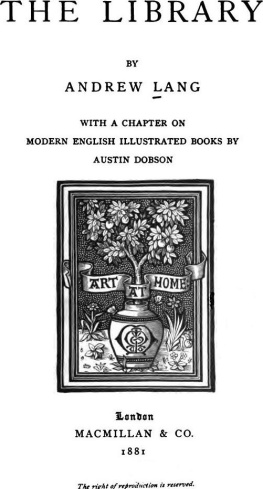The History Of Scotland Volume 12
From Jacobite Leaders To The End Of Jacobitism
Andrew Lang
Contents:
The Jacobite Churchmen And Statesmen. 1704-1735
Life In The Highlands. 1715-1745
Life In The Lowlands. 1700-1745.
THE HISTORY OF SCOTLAND VOLUME 12, Andrew Lang
Jazzybee Verlag Jrgen Beck
86450 Altenmnster, Loschberg 9
Germany
ISBN: 9783849604578
www.jazzybee-verlag.de
THE JACOBITE CHURCHMEN AND STATESMEN. 1704-1735
IN religious matters the clergy of the suffering Church Episcopal in Scotland were not much more harmonious and peaceful than their wrangling Presbyterian brethren. The last Primate, Archbishop Ross of St. Andrews, died in June 1704, and with him passed away the Primacy and the Metropolitan jurisdiction. The remaining bishops and clergy did not attempt to promote a new Primate: it might have been unsafe, and they had a singular respect for their king, though an exile, a Catholic, and a boy of sixteen. Since Father Innes regarded a promise on James's part to protect the Church of England as "sinful," he probably would not have approved of James if he appointed a Primate over the Episcopal Church of Scotland. These illogical loyalists, the Jacobite clergy, had now a very scant supply of bishops to carry on the Episcopal succession, and deemed it the best plan to consecrate bishops without dioceses. The Episcopal order would be kept up, yet the king's privilege of nominating to vacant sees would remain intact. Sage and Fullarton were consecrated in this irregular fashion: the former had been recommended for the Chair of Divinity in St. Mary's College, St. Andrews, in 1688, but the Revolution came, and in 1696 Sage was obliged to skulk "in the hills of Angus." At the consecration, Bishop Ross of St. Andrews takes the title of " vicar general."
After 1716 Rose was the only survivor of the pre-Revolutionary diocesan bishops, and acted practically, though not in name, as Primate. In 1709 the bishops were recruited by the consecration of Falconer and Christie, the proceedings, as before, being as secret as possible. Sage died in 1711, and Archibald Campbell was consecrated. He was the son of Lord Neil Campbell, and was nephew and companion-in-arms of the Earl of Argyll, executed for rebellion in 1685. His life was spared; he became a Jacobite, was ordained in London, and, after becoming a bishop of the Scottish Church, he remained in England. In London, too, was consecrated (1712) James Gadderar, by the non-juring Hickes, at one time chaplain to the Lauderdale of the Restoration, and Bishops Falconer and Campbell Bishop Rose and the other Scottish bishops approved, and the step tended to merge the Scottish with the non-juring English ecclesiastics. The use of the Prayer-Book, all but extinct among the Episcopalians of the Restoration, was now revived, though it seems to have been disliked by the Lowland Episcopalians of the poorer class. In Aberdeen it was brought into the College Chapel, which Government closed. The book employed was the English Liturgy, not that which Laud vainly attempted to thrust on the Kirk; but Laud's book even now continues to trouble the Scottish Episcopalians. The Liturgy was licensed by the Toleration Act of Queen Anne in cases where the Episcopal ministers took the oaths of Abjuration and Allegiance; but these men were in the minority, especially after the death of Queen Anne, who, at least, was a Stuart. In the Rising of 1715 the Episcopal clergy were notoriously, those of Aberdeenshire were publicly, on the side of James.
In May 1716 King George bade the Scottish judges shut up Episcopal chapels in which he was not prayed for; and the peccant clergy were summoned and commanded to register their letters of Orders. Those who complied continued to officiate. In Aberdeenshire several were deposed by their Presbyteries, and their churches were held against them by armed force. In 1719, while the Abjuration Oath was being softened for Presbyterian acceptance, as we have seen, it was enacted that no Episcopal clergyman should officiate before nine or more persons in addition to those of his own household, unless he took the Abjuration Oath and expressly prayed for King George. The penalty was imprisonment for six months and the shutting up of his chapel. The Act appears not to have been strenuously enforced. The acting Primate, Bishop Rose, one of James's agents, died in March 1720, and was buried in that old church where lie the Logans of Restalrig, a church that the first General Assembly had doomed to destruction as a "monument of idolatry." Rose had kept peace in his day among his brethren, but now there was no surviving diocesan bishop. No bishop had any acknowledged jurisdiction.
Meanwhile the singular Erastianism of the Jacobites, represented by Trustees, a body of men suggested by Lockhart of Carnwath and accepted by James, came into play. Without consulting the king, but confident of his approval, the clergy selected Fullarton to fill the place of Rose, and the bishops were constituted an Episcopal College. Lockhart, writing on April 25, 1720, laid the facts before James for his sanction. He explained that Mr. Archibald Campbell had none of the qualifications needed in a bishop, and by no means all of those desirable in a gentleman; that his consecration had been most imprudent; and that he was now in Edinburgh forming a party and urging "unseasonable doctrines." James should therefore support Fullarton, for whom an income of;ioo a-year had been subscribed. The king, in a letter of grateful courtesy to the bishops (July 2, 1720), approved of their promotion of Fullarton, though circumstances " had not permitted certain forms to be observed," but suggested that, in future, the names of proposed bishops ought to be submitted to himself. " We shall, you may be assured, have all possible regard for your opinion in such cases." There was, however, one candidate whom the king named, Freebairn, who was not very acceptable to the suffering Church. Lockhart remonstrated; Freebairn "was not under any bad character," but his learning and good sense were deemed inadequate by the clergy and laity. Lockhart hoped that in future the king would consult the bishops before making any nomination.
Here we have, practically, the question which rent the Kirk the question of the patron, the presbytery, and the people. Freebairn's son was then at Rome, and persuaded James that the bishops objected to his exercise of patronage, "which the king took very ill." His shred of prerogative seemed to be at stake among his most devoted subjects. The bishops caused Lockhart to explain, showing that there was no need of hurry, and that they had consulted the king's Trustees, Hamilton, Wigtoun, Kincardine, Balmerino, Dun, Maul, and Paterson, who all agreed that haste was prejudicial (March 27, 1722). James replied that two of the three bishops nominated by him had been proposed to him "by friends in your party." The bishops, therefore, consecrated Freebairn, with the Rev. Andrew Cant, whose name is singularly unprelatic.
Bishop Falconer made some objections, being " afraid of the rights of the Church "; but Lockhart soothed him with the letter in which the king had expressed his intention not in future to name any candidate without previously consulting the bishops. The plot of Layer and Atterbury at this date (1722) made communication between James and his faithful ones difficult and dangerous.
Meanwhile the suffering Church was troubled by "Ritualism," a malady most incident to Protestant communions. The English nonjurors, as Lockhart remarks to James (December 7, 1722), had long been at war among themselves "concerning some alterations that some of the number desired in the Liturgy and forms of worship." Both Archibald Campbell and Gadderar, the Scots bishops consecrated in England, were advanced ritualists, as were the Aberdeenshire Episcopal clergy, who had made Campbell their Ordinary. The other bishops resisted this harmonious call: Gadderar acted, for a while, as a kind of suffragan to Campbell, and, in 1725, to Gadderar did Campbell resign, with an irregular reservation in his own favour. All bishops, save Falconer, Gadderar, and Campbell, were opposed to the ritual, the "Usages," which the northern brethren desired to introduce, but, says Lockhart, " the clergy, of all mankind, are most zealous to propagate and advance their own schemes." ong ago Calvin had deemed the schism in the Church of English exiles at Frankfort



